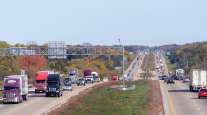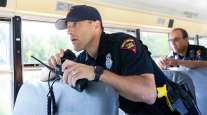Wisconsin Transportation Secretary on Hot Seat as Republicans Clash on Road Funding

The share of state highways in poor condition would double during the next decade without an infusion of new revenue, Wisconsin Department of Transportation Secretary Mark Gottlieb told lawmakers Dec. 6.
Lawmakers grilled Gottlieb during a three-hour exchange that framed the escalating split between statehouse Republicans on how to fund roads, bridges and transit in the state’s next budget — and whether a transportation tax or fee increase may be warranted.
Soiking costs for one of the state's biggest ongoing highway expansions, of U.S. Interstate 39/90 from the Beltline to the Illinois state line, came up during a Dec. 6 hearing of the Assembly Transportation Committee. The project's estimated cost has ballooned from $715 million to $1.2 billion — a shift Gottlieb attributed to an errant initial estimate.
"We learned very soon that it was not possible to build the project for that amount of money," Gottlieb told reporters after the hearing.
Gottlieb billed his blueprint for the state's next two-year transportation budget as a bid to refocus on preserving, not expanding, bridges and highways. He said the DOT budget request, which he put forth in September, prioritizes safety and maintenance of roads and bridges and funding for local roads.
At the direction of Gov. Scott Walker, the request does not increase taxes or fees. But Gottlieb acknowledged to lawmakers on Dec. 6 that the state's transportation network would deteriorate badly in the next 10 years without a funding increase. The state transportation fund is filled primarily with revenues from the fuel tax and from vehicle registration fees.
Gottlieb first made similar remarks in an interview with the Wisconsin State Journal in June.
At current funding levels, 21% of the state trunk highway system would be rated in poor condition under DOT methodology in fiscal year 2018, Gottlieb testified on Dec. 6.
By fiscal 2027, that share would balloon to 42%, he said. The bulk of the impact would be to secondary, or non-backbone roads — roughly half of which would be in poor condition in 10 years, Gottlieb said.
Some lawmakers pressed Gottlieb on the issue, saying his no-new-revenue plan doesn't do enough to stabilize transportation finances.
Other lawmakers cast the department as profligate in its spending, questioning everything from the type of materials used in bridge construction to its travel costs for out-of-state conferences.
The transportation issue is dividing statehouse Republicans as they size up the state's next budget.
Republicans publicly clashed in the lead-up to the Assembly hearing, as Sens. Duey Stroebel, (R-Saukville), and Chris Kapenga, (R-Delafield), told reporters they side with Walker in saying taxes or fees should not be increased.
But Rep. John Nygren, (R-Marinette), said Dec. 6 that state leaders have maintained for years that the timing wasn't right to raise taxes or fees for transportation. Given the condition of the state's roads, lawmakers may be nearing a point at which they must act, Nygren said.
"This is not something that I'm excited about, but we should consider all our options," Nygren said.
Rep. Joe Sanfelippo (R-New Berlin) grilled Gottlieb about the types of traffic signals installed by the department at certain intersections and its out-of-state travel budget.
“The department has to take a much more serious look at ways that they can save money," Sanfelippo said.
Transportation funding has been a topic of recurring controversy in the state Capitol during the past six years. In 2013, a bipartisan panel whose members were appointed by Walker and GOP lawmakers found the DOT would need an average funding increase of $1.35 billion a year from 2014 to 2023 just to maintain current road, bridge and transit conditions.
The discrepancy between revenues and expenses has been driven by a combination of crumbling roads and bridges, sharply rising construction costs and stagnant fuel-tax revenues.
Those circumstances forced state leaders to increase transportation borrowing and delay highway projects in the 2015-17 state budget. Projects delayed included the second phase of the Verona Road expansion in Dane County and the U.S. I-39/90 expansion.
More of the same would be required the next two years without an infusion of transportation revenue.
The transportation budget request put forward by Gottlieb calls for further delays to the Verona Road project. The I-39/90 project would be kept on schedule.
Also delayed under the request are the I-94 North-South project in Racine and Kenosha counties and on north leg of Milwaukee County’s Zoo Interchange, the state’s oldest and busiest freeway interchange. The core portion of the interchange, which now is being rebuilt, would remain on track for completion in 2019.
Walker's office has noted the DOT request would bring transportation borrowing to its lowest level since the 2001-03 state budget.
Wisconsin's gas tax has not been increased since 2006, when it went from 29.9 to 30.9 cents per gallon.
The registration fee for automobiles was last raised in 2008, from $55 to $75.
Walker has vowed to veto an increase of either, unless it's paired with a corresponding tax or fee decrease elsewhere in the budget.
In a statement released Dec. 5, Walker said voters gave Republicans control of state government in 2010 "to lower taxes and rein in an out-of-control government."
"We cannot now, after six years in charge, turn our backs on the people who placed their trust in us to make good on that promise," Walker said.




